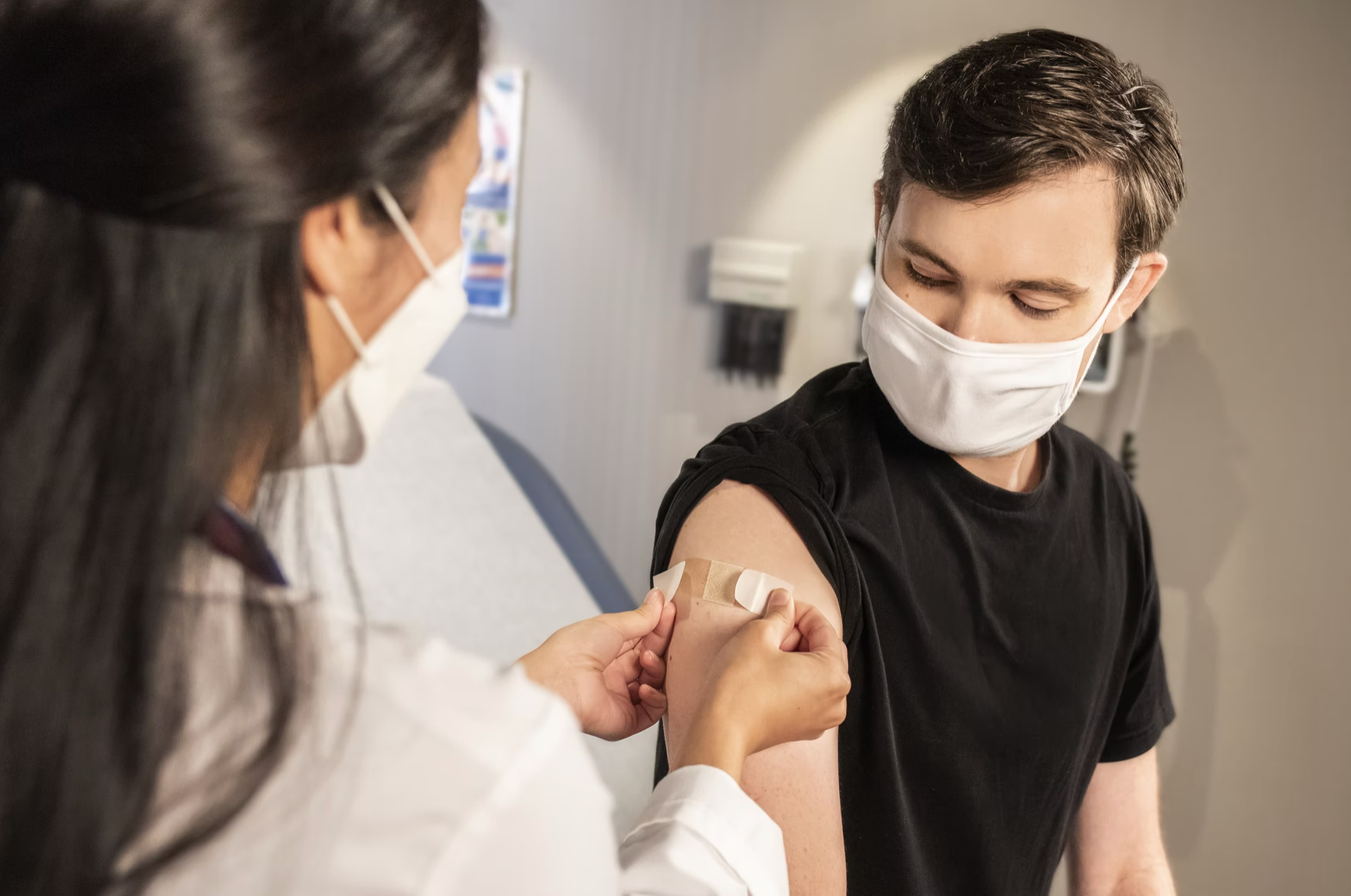
Doctors 'running out of gas' in fight against misinformation
Editor's note: Hays Post contacted several Ellis County students to learn what they have heard about the COVID-19 vaccine amongst peers and on social media. The quotes below are the responses, without attribution.
Hays Post
Despite last month's decision to authorize COVID-19 vaccinations for everyone age 5 and older, the Kansas Department of Health and Environment reported last week the overall vaccination rate in Ellis County for those age 12 and older remains just over 50 percent — well below the statewide average of 65 percent.
A September study from England published by Lancet showed about half of teens age 12 and older were either hesitant or would opt out of the vaccine altogether.
Dr. Heather Harris, chief medical officer at HaysMed, and Dr. Michelle Pope, pediatrician at Hays Pediatric Center, said teen hesitancy is a conversation they have on a regular basis with patients and parents.
"Often, whatever the parents have decided for themselves, obviously there will be a similar decision for the kids," Pope said.
She said the most common concern is that the vaccine was "so rushed."
"It's not really true. Parts of the process have been in place for over a decade," Pope said, noting development of the MRNA science used for the COVID vaccine began when SARS and MERS threatened to become a significant health issue. "The technology is definitely not new. It just feels new ... because SARS and MERS never became a pandemic."
Harris said she believes part of the hesitancy stems from a more base instinct.
"At the end of the day, kids don't like shots," she said. "But that just has to be 'time to be a parent.' You know they're going to be fine. There's just more fear than there is harm."

Fighting misinformation
Both Harris and Pope offered the reassurance that the vaccine has been proven overwhelmingly safe – despite misinformation many children are faced with on social media.
"Kids get multiple vaccines over their life, and for the majority, there's very little concern about it," Harris said. "The scientific community has provided us with safe and effective vaccines, and there's no concern that this is any different.
"(The COVID vaccine's safety) has been politicized, but we all know it's just not true. Over a billion people have been vaccinated with very little to no harm."
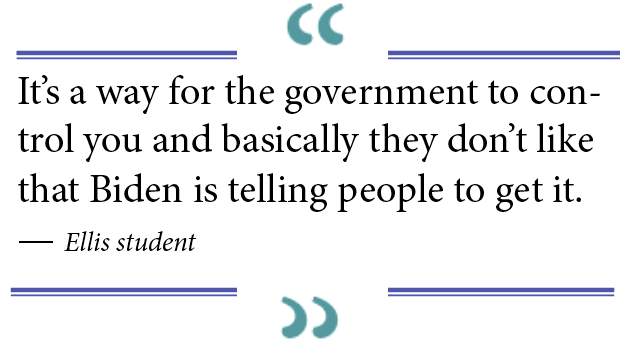
A recurring bit of misinformation both Harris and Pope have heard is in regard to fertility in teen girls, although Pope noted there are studies actually showing heightened risk for unvaccinated men diagnosed with natural COVID to develop sterility. With the vaccine, however, Pope added that has not been shown to be a risk.
"They're spreading rumors amongst each other, and they don't have the right information to understand the misinformation," Harris said.
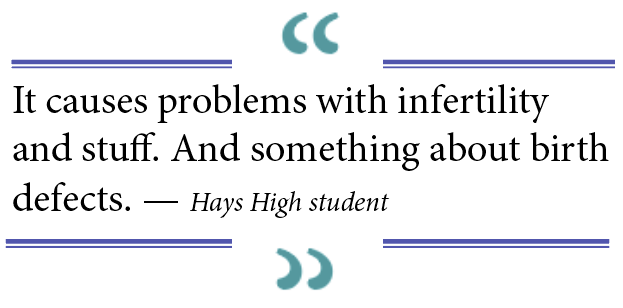
Pope said the data shows children and adults have the same occurrence of mild reaction to the vaccine as adults — about 50 percent. She noted the vast majority of those reactions — site tenderness, fatigue and aches — happen within 12 to 24 hours of the shot, are short-lived and treatable with over-the-counter pain reliever.
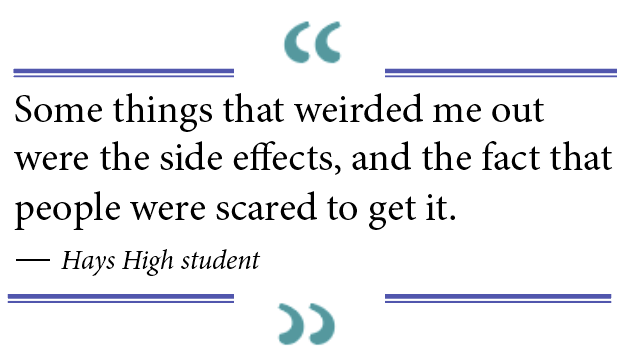
She noted that children who contract natural COVID, however, have an increased risk of long-term effects, including "pins and needles" nerve inflammation, joint aches, extreme fatigue and headaches.
Pope acknowledged there have been cases of myocarditis — inflamation of the heart muscle — in teens following the vaccine, but noted natural COVID causes the same condition and can create permanent, long-term damage to the heart.
Vaccine-related myocarditis is "very, very rare," she said.
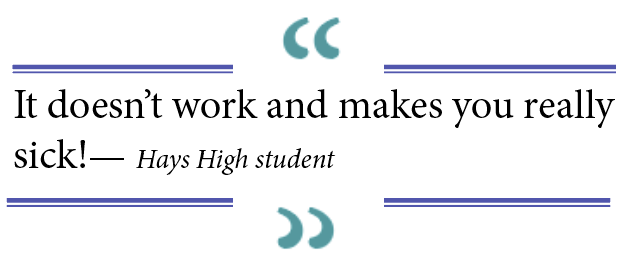
Clinical trials have shown no occurrence of myocarditis in children age 5 to 11, according to reports from the American Medical Association published in mid-November.
Beds and bodies
Harris again noted that the delta variant of COVID is affecting the younger population more seriously than the original strain, with the average COVID inpatient age now about 60 years old. Hospital stays have become longer and the outcomes have become more treacherous for otherwise healthy people.
"A great majority of those being hospitalized are unvaccinated. They're quite sick, have long hospitalizations, a long recovery and we're starting to see more deaths occur .. in relatively young people," she said. "The 50- to 60-year-old group has been pretty stubborn about getting the vaccine, and they're the ones being hospitalized."
While the majority of inpatients at HaysMed had been from outside the county in recent weeks, as of Tuesday, about half of the 20-plus COVID inpatients were Ellis County residents. There have been some breakthrough cases of COVID in vaccinated patients, but Harris said most of those individuals were already immunocompromised or elderly.
Hospitalization of COVID patients — the vast majority unvaccinated — continues to take its toll on the staff at HaysMed, which, like most health care institutions across the state and nation, is fighting staffing issues. HaysMed also has been intermittently closed to out-of-county transfers over recent months with the influx of COVID inpatients.
"We're in need of nurses, all levels of hospital functions," Harris said. "We're short-staffed in multiple departments. ... If we were only left with those vaccinated, we would just have a handful of COVID patients."

Pope said that while staffing levels at the pediatric center are not a concern, the number of COVID patients occupying beds is an issue when a child must be admitted for any condition. With a more vigorous flu season expected and the annual uptick of RSV expected over the next three months, this means the potential for more pediatric transfers out of HaysMed. She said it's common in a normal year for pediatric patients to be admitted for influenza or RSV.
"We rely upon the same nurses, who are in short supply," she said. "The COVID patients are taking up resources for RSV patients," noting children have been transferred to Kansas Mercy Hospital or Wichita due to space and staff concerns.
'An interesting conversation'
Pope said she encounters three main mindsets after asking her patients' parents if they have been vaccinated.
"It's an interesting conversation," she said. "The response is 'yes' or a quiet 'no' or a very robust 'no.'
"When I ask 'Then what are your concerns?' ... 25 to 50 percent of them don't want to talk about it. There's no conversation to be had. I restate the science, tell them I have no concerns and tell them I've put my money where my mouth is ..."
Of the "hard no" parents, she added, "I don't think I've had much success. The 'soft nos,' I've convinced some of the parents to get the vaccine, which is probably the first step to getting the kids vaccinated."

Harris said the vaccine discussion is a frustration for herself and the hospital staff.
"It's frustrating and sad to know so many people don't have to get so sick," she said. "I see it on a regular occurence with unvaccinated patients I've counseled. ... They don't get vaccinated, and they pass away or have weeks and months of getting better.
"We keep trying to encourage people every day the best we can, but we kind of start running out of gas."
Pope said the staff of the pediatric center is "really exhausted" after nearly two years of battling COVID. She noted that many times the pediatric staff is the parents' first real conversation with a health professional, as parents with children often spend more time in a doctor's office with their kids than with their primary care physician.
Pope added that the pediatric staff has been providing vaccinations before the clinic opens, meaning staffers have been working early since May or June.
The risk
The risk, Harris said, isn't the vaccine or necessarily that teens will become extremely ill — although she said there has been a steady increase in youth hospitalizations since the delta variant arrived in Kansas.
A larger concern is that teens and college students are "highly effective at spreading illness."
"There are multiple examples where we've seen teenagers, inadvertently, who have been sick with COVID and then have spread it to elderly grandparents — and the grandparents have passed away," she said. "You have to protect the people around you."
Teens are also developing socially and educationally, and COVID can be a major life disruption.
"(The vaccine) is protecting them from missing school, missing activities," she said. "And if you can keep your kiddo from not feeling terrible for 10 to 14 days, that doesn't seem like such a terrible idea."

The decision
Both Harris and Pope said there is a time when parents have to parent when to comes to the vaccine.
"More kids have died from COVID than influenza in any year," Pope said. "It's mild for most kids, but still significant. ... You just never know if that's going to be your kid or not.
"Teenagers should be part of the conversation because we're teaching them to be adults, right?" she added. "You're either going to get COVID or get the vaccine. We can't make COVID go away. But we can control it."
She noted "natural immunity" for those who have previously contracted COVID is not nearly as effective as the vaccine. When the body attacks a natural virus, it creates a wide variety of proteins to ward off a wide variety of potential causes. With the vaccine, those proteins are aimed directly at COVID.
"If you get the vaccine after you had had COVID, you boost that spike protein that has the most benefit," Pope said, adding "coronavirus has always been here. We just didn't have one that made people this sick."
Harris reiterated that the vaccines are safe and effective.
"At some point, it's just time to be the parent and help them make good decisions and have an environment of wellness," she said.
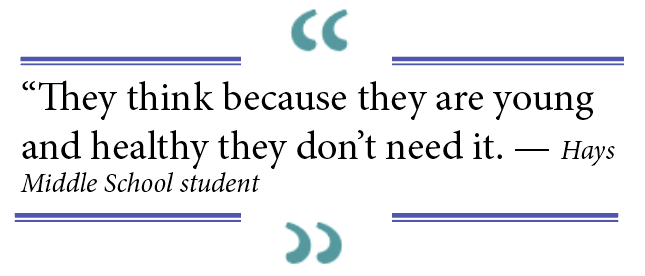
With the Ellis County case rate curve ominously similar to the fall and winter of 2020, Harris said the trend could continue.
"December matches the wave from last year," she said. "This is the time of the year when the peak of COVID occurs — 10 to 14 days after the holidays. People are back indoors, gathering in groups, mixing and matching their social circles, traveling."
Interim Ellis County Health Department Director Kim Reel offered the following statement.
"CDC recommends getting the COVID vaccine," she said. "We encourage everyone to reach out to their primary care physician to discuss further."






